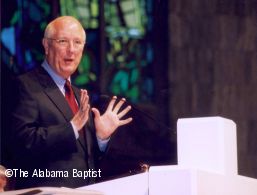With one word, the commander of the Governor’s Task Force on Illegal Gambling took the bloom off the rose gamblers are trying to sell to Alabama. That word was “corruption.”
Speaking to a Birmingham service club March 23, John Tyson said corruption is the biggest threat facing Alabama today. He specifically pointed to “casino operators who openly defy the law thinking they can be protected by the influence they wield with public officials.”
Recent revelations have made Tyson’s charge believable. Citing the tax records of former Birmingham Mayor Larry Langford, The Birmingham News reported March 3 that Langford won 555 slot machine jackpots during 2006, 2007 and 2008. His total winnings came to at least $1.5 million.
He won 36 jackpots in one night — Feb. 9, 2008. Such miraculous “luck” is beyond belief. Mathematically the odds of hitting so many jackpots are astronomical. Perhaps that is why a recently filed civil lawsuit against VictoryLand, Alabama’s largest casino located in Macon County, and its owner, Milton McGregor, seems believable to many. In the suit, Michael Knowles, a VictoryLand security guard, testified that VictoryLand staff escorted Langford to certain slot machines that had been rigged for his benefit.
VictoryLand attorneys called the charges “frivolous” when they were first made. But since Langford’s winnings — as reported on his income tax returns — were made public, the lawyers have been strangely silent.
Now when Tyson says, “When a public official can walk into a casino, sit down at a hand-picked machine and walk out with tens of thousands of dollars and over $1 million over time, it becomes clear that there is almost no limit to the corruption that the casino syndicate is capable of,” people respond with an understanding look.
Langford’s relationship to McGregor, Alabama’s gambling czar and a frequent contributor to the former mayor’s many political campaigns, may be Exhibit A in Tyson’s charge of corruption, but it certainly is not the only example.
Alabama Supreme Court Chief Justice Sue Bell Cobb had to remove a judge from a White Hall gambling case after it became public that the judge had ties to the gambling industry.
Unfortunately the judge who was removed had already rendered a decision protecting the White Hall casino from further raids by the task force. That ruling was overturned.
People who follow gambling activities closely say there is a small cadre of legislators, judges and attorneys in the state whose names surface again and again on gambling activities. And Tyson ticks off a list of questionable deals in which family members of local officials in Houston County reportedly have jobs or contracts with casino operations in the area.
“When casino operators who openly defy the law can be protected by the influence they wield with public officials, we have a serious problem in Alabama,” Tyson said. And we do.
That point was illustrated March 22–23. First Attorney General Troy King announced that he was taking over the task force and that Tyson could return to his duties as district attorney for Mobile County. He also demanded that all the evidence Tyson had seized in his raids on illegal gambling activities across the state be turned over to the attorney general’s office.
Within hours, casinos shut down by the task force and others, including Country Crossing in Houston County and White Hall in Lowndes County, announced they would reopen.
But when Gov. Bob Riley pushed back, saying he alone had executive authority and that Tyson would continue to lead the task force, the casinos quickly changed their minds and stayed closed.
Riley pulled no punches with the attorney general. He said, “The actions of the attorney general have already had the effect of increasing, not decreasing, illegal gambling in the state.”
He added, “Although the attorney general says that he is against gambling in Alabama, he was presented in 2004 with a letter from the federal government that stated that there was illegal gambling taking place in Alabama. If the attorney general had done his job then, we never would have had this explosion of slot machines that we now have to deal with.”
It is a sad day for Alabama when the attorney general refuses to enforce the state’s criminal code regarding illegal gambling. Is it any wonder that some observers are asking if King is the mysterious source that Country Crossing owner Ronnie Gilley refuses to name as the “state official” who called him in 2007 suggesting electronic bingo gambling could pay for his projected entertainment center?
Meanwhile McGregor continues to operate as if immune from the ruckus over illegal gambling. His influence is seen in the state Legislature, where another massive gambling bill is on the horizon. When the first effort to expand gambling in the state, Senate Bill 380, failed earlier in the session, sponsor Roger Bedford promised the bill would not come back. But with a slight of hand, a tweaked version of Bedford’s bill is back. It is back because of McGregor’s pervasive influence. Whether it will pass is still in doubt.
But observers are beginning to ask if the civil suit against him and the revelation about possible criminal activity related to Langford will bring McGregor and his empire down like a civil suit brought down former HealthSouth CEO Richard Scrushy’s house of cards.
And if McGregor falls because of alleged activities with Langford and back taxes on his gambling income since his slot machines did not meet the Supreme Court’s definition of bingo, then how many others will fall with him? Will there be other revelations of corruption, of influence peddling, of pay-for-play schemes?
Corruption. Gambling. The two are inseparably linked, and that certainly takes the bloom off gambling’s rose.






Share with others: